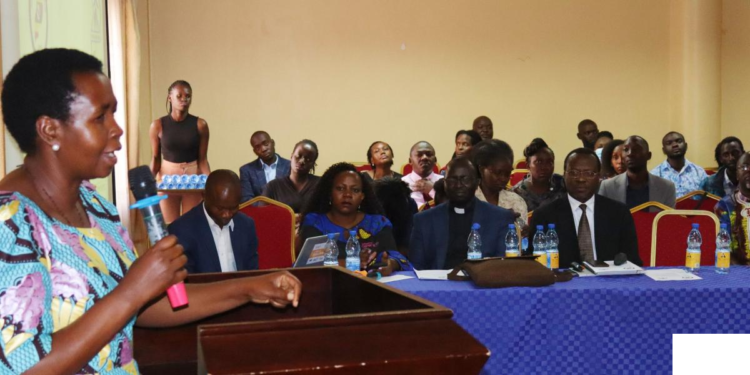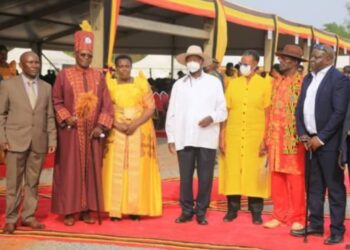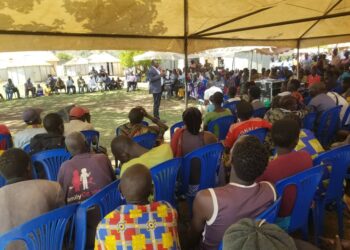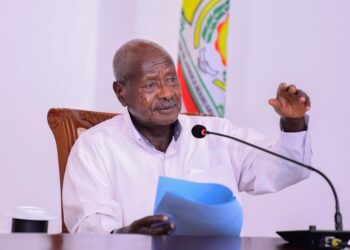Rights activists in Uganda have vehemently opposed the East African Community Sexual Health Reproductive Bill, 2021 and, have consequently asked the Government to disapprove it.
The position was reached at during a day-long public hearing discourse organized by education, health and rights activists to get feedback on the proposed law which was held at the Hotel Triangle in Kampala on Monday.
It was attended by several participants who included human rights lawyers, Members of Parliament, Civil Society Organizations – CSOs, school proprietors, concerned parents, the media and the representatives of the Inter-Religious Council of Uganda – IRCU.
Anchored on Article 118 of the EAC Treaty, the Bill seeks to facilitate the attainment of the sexual and reproductive health and rights of all persons; provide for integrated sexual and reproductive health information and services as part of the universal health coverage of each Partner State, and to eliminate of harmful practices such as forced genital female mutilation.
It also aims to reduce and eliminate unsafe abortions, HIV and other sexually transmitted infections, early and unintended pregnancies”. Article 16 of the Bill states that a woman should be able to terminate her pregnancy if there is a need for emergency treatment or due to rape or incest.
It also provides for comprehensive sexuality education to a child in school, and promotes commercial surrogacy, also known as a gestational carrier – when a woman conceives, carries and gives birth to a child for another person or couple. The surrogate undertakes to surrender the child to that person or couple after the birth.
Further, the Bill advocates for assisted reproduction and In-Vitro Fertilization, a process of fertilization where an egg is combined with sperm in vitro. It involves removing an ovum from her ovaries and letting sperm fertilise them in a laboratory which clashes with practices and beliefs of some religions and African traditions.
It is against this background that Eng. Stephen Langa, the Proprietor of Family Life Network Uganda observed that the Bill violates the foundational moral principles of African society, and asked the Government to instead promote and strengthen parent-led sex education initiative.
Rev. Fr. Jonathan Opio, the Executive Director of Human Life International Uganda pointed out that Clause six of the Bill restraints a parent from interfering with the sexual reproductive rights of an adolescent, a glaring recipe for laxity that will mislead the youth into immoral acts.
Lawyer Phionah Rwandarugali observed that the Bill contravenes the established cultural and norms including Article 22, 31 and 37 of the Constitution, adding that the Government should disapprove it with the contempt it deserves.
Equally, Anne Tendo, an advocate at Crownel Company Ltd, a pool of legal professionals’ body in Uganda warned that the Bill has been convincingly crafted by the legal minds making it difficult to detect the wrong motives behind it.
Tendo, however, warned that if Uganda assents to the Bill, she would be bound by the good faith principle and it would be very difficult to reverse the decision as courts and legal practices hold that regional treaties are superior to domestic laws of the partner states.
The Bill, was first introduced in the House by Dr Odette Nyiramilimo, the former Member of the East African Legislative Assembly – EALA from Rwanda during the tenure of the 3rd Assembly. The Bill was read for the first time on January 28th 2017 and accordingly, referred to the Committee on General Purpose.
Whereas the Committee on General Purpose (of the 3rd Assembly) carried out public hearings in six of the partner states on the Bill in February, 2017, their tenure came to an end before the Bill was subsequently tabled for the second and third readings.
In effect, the 4th Assembly upon its inauguration, passed a resolution to, among others, save, retain and continue with the same Bill after Dr. Odette lost her seat, and had ceased being a Member of the Assembly. This prompted Kennedy Mukulia Ayason from South Sudan to present it as Private Member’s Bill.
But George Odong, a member of the General Purpose Committee, and Chairperson of the Uganda Chapter at the EALA revealed that even if other member states pass the Bill, Uganda will exercise the power of veto to reject the Bill as provided for under Article 63 of the EAC Treaty.
The General Purpose Committee has 30 days to send a report on the public hearings to the Speaker, and thereafter it should be tabled and debated. However, it still faces an uphill battle because members objected to its earlier versions.
Do you have a story in your community or an opinion to share with us: Email us at editorial@watchdoguganda.com













